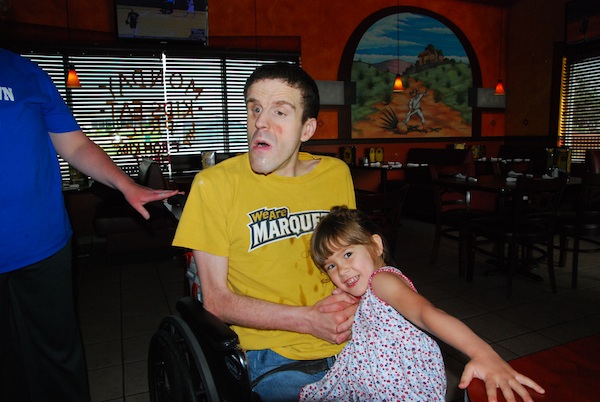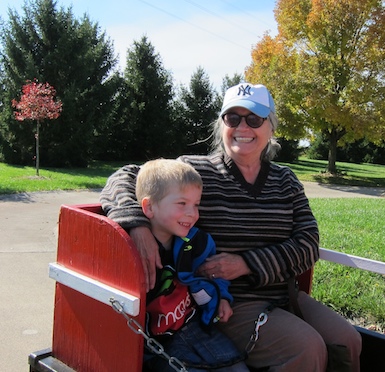Gus & Us
August 10, 2013 • 32 Comments • Posted in baseball, Mike Knezovich, parenting a child with special needs, Uncategorized, writing
Gus loves to get out, and every other Saturday he goes to dinner with Bobbie Ladwig’s family. Here he’s getting attention from one of Bobbie’s daughters.
The emotions that come with loving an adult child who has significant disabilities can be difficult to put into words, but when a reporter interviewed my husband Mike for a story about our son Gus in this month’s Bethesda Messenger, Gus’ dad found just the right things to say.
Gus and his three roommates moved into a four-bedroom ranch house in Watertown, Wisconsin in 2006, and the story is an update on how they are doing now, seven years later. The house is supported with 24-hour staffing, and when he’s home, Gus loves sitting at the front window and watching kids play baseball in the small park across the street. Thing is, though, Gus is hardly ever home!
Our son rides a van to a nearby workshop on weekdays, and on his days off, Gus goes to music concerts, attends baseball games, visits the zoo. This weekend he’s going to a carnival with Bobbie Ladwig, one of the direct support professionals at his house. It’ll be Gus’ first time on a Tilt-o-Whirl, and I don’t know who is more excited, Bobby or Gus. In the Messenger article, Bobby tells us that a favorite activity for Gus is eating out at local restaurants :
Ladwig’s wife and six children have become part of the routine. “Every other Saturday, on the days I work, my family meets all of us at the selected restaurant,” Ladwig said. “My kids really look forward to seeing the guys and it is a great time.”
Uprooting Gus seemed daunting to us at first. We would have rather had Gus live in a group home closer to our apartment in Chicago, you know, so we could drop by whenever we feel like it, take him out for ice cream, bring him home to visit now and then. Illinois ranks shamefully low when it comes to providing services for people with developmental disabilities, so Mike and I felt extremely fortunate and grateful to find Gus a home in a facility hours away in Wisconsin. His house is run by Bethesda Lutheran Communities, Inc. “Things have been good for Gus. He gets out of the house and there are plenty of things that he is doing,” Mike told the Messenger reporter. “We have faith in the Bethesda organization.”
On our drives home from visiting Gus, Mike and I always talk about relocating to Wisconsin ourselves. Until that happens, we take great comfort in knowing our son is in good hands, and that he’s healthy and very happy.
Gus benefits from living in a regular neighborhood, and the community benefits from having him out there with them, too. “We used to come up to make sure Gus was OK,” Mike said. “Now we come just to visit him.”

